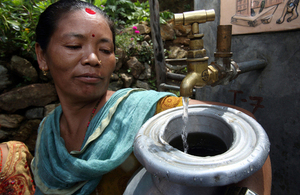New support to Gurkha heartlands
Britain will provide clean water and sanitation to retired Gurkha soldiers, their families and communities in Nepal.

A woman collects clean water from a tap in Nepal. Picture: AusAid/Jim Holmes
Britain will provide clean water and sanitation to retired Gurkha soldiers, their families and communities living in remote Nepali hilltop villages, the Minister of State Alan Duncan announced today following a visit to the Gurkha heartlands.
Access to clean water means retired Gurkha soldiers can live out their lives in dignity in Nepal, their families can enjoy good health, and their children can go to school rather than spend their days trekking to fetch clean water.
New funding of £10 million will enable the construction of 400 water supply systems and nearly 10,000 latrines, through the Gurkha Welfare Scheme.
Poor sanitation and lack of clean water is a major issue in rural Nepal and thousands of children under five die each year from preventable water-borne diseases.
This year marks 200 years since the start of the Anglo Nepali war (1814-16), where the British first recognised the potential of the fierce Gurkha warriors and began recruiting them. 2014 also marks the centenary of the First World War: Gurkhas fought in France, Turkey, Palestine and Mesopotamia.
Minister of State Alan Duncan said:
Britain has a powerful historic link with the Gurkhas. We are getting clean water and sanitation to the hilltop Nepali communities from which we have recruited soldiers.
It may seem simple but it is transforming communities. Retired Gurkha soldiers can spend their last years in good health and dignity, and their grandchildren can spend their days going to school, rather than travelling long distances to fetch clean water. This is something the British public can be proud of.
The water projects DFID funds are delivered through the Gurkha Welfare Scheme which provides aid to Gurkha ex-servicemen, their families and communities. As well as getting clean water supplies into homes and schools in some of Nepal’s remotest communities, the Gurkha Welfare Scheme runs residential homes for the elderly, provides medical care, and educates communities about sanitation.
The work DFID has already done to provide Gurkha communities with clean water has had multiple knock-on benefits, especially for women. Improved sanitation not only saves women’s lives, it will also save them on average three hours a day in time spent collecting water. Meanwhile children can go to school rather than collect water.
Notes to editors
-
The new funding from DFID will allow the Gurkha Welfare Scheme’s Rural Water and Sanitation Programme to run for an additional five years, up to 2020.
-
Nepal is the 16th poorest country in the world and 25 per cent of Nepalis live below the poverty line.
-
The Department for International Development has a country wide programme to help alleviate poverty and generate economic development in Nepal.
-
Between now and 2015 DFID will work to ensure that 230,000 direct jobs are created through private sector development, 4,232 kms of roads are built or upgraded and 250,000 people benefit from safe latrines. In addition, DFID will help 4 million Nepalis to strengthen their ability to cope with natural disasters and the adverse impact of climate change.
General media queries (24 hours)
Email mediateam@dfid.gov.uk
Telephone 020 7023 0600
If you have an urgent media query, please email the DFID Media Team on mediateam@dfid.gov.uk in the first instance and we will respond as soon as possible.